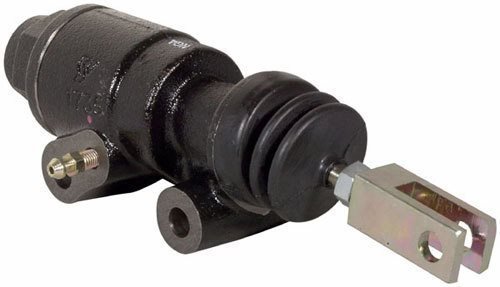The forklift brake master cylinder is the primary element of your forklift’s braking system. It converts foot pressure onto the pedal into hydraulic pressure that opens up brake wheel cylinders to activate brakes.
Brake fluid leaks can drastically reduce your forklift’s braking power, so it is essential to make sure that the brake master cylinder is functioning optimally.
Brake Pedal Feels Spongy
When pressing on the brake pedal, it should feel firm and exert some force. If it feels spongy or soft, there may be an issue with your system and need to visit a mechanic for assistance.
Spongy brakes can be caused by air in the braking system or fluid contamination. They may also be indicative of a worn master cylinder.
A worn master cylinder can cause brake fluid to leak, leading to a soft pedal. If your master cylinder is faulty, have it replaced immediately for optimal performance and safety.
Brake lines are metal, so they may rust or corrode over time. This corrosion can lead to small holes forming which allow fluids to escape.
Leaks in brake lines can absorb liquid, impairing proper braking operation. This could result in a spongy brake pedal and reduced brake pressure.
Brake Pedal Sinks
When the brake pedal is depressed, pressure is applied to hydraulic pistons in the master cylinder and transmitted onto calipers or wheel cylinders.
If the brake pedal feels weak and sinks all the way to the floor, there may be an issue with your braking system. This could be caused by either a leak in brake fluid or air entering into the system.
A malfunctioning master cylinder may also cause the brake pedal to slowly sink when depressed. This occurs when liquid inside leaks past its seals, allowing air and liquid inside to escape.
To determine whether your master cylinder has a problem, press and hold a plunger in the rear of the unit. It should feel firm if not immovable after pressing for several millimeters.
⚡️Another article: Caterpillar Forklift Brake Master Cylinder
Brake Fluid Contamination
The brake master cylinder is an essential element of a forklift’s braking system. If it becomes malfunctioning, the brakes won’t function correctly.
Fortunately, brake master cylinders are designed to last for years. Unfortunately, they can become damaged due to contaminants that become trapped inside during normal usage.
One of the most frequent sources of contamination is brake fluid. Brake fluid has a hygroscopic nature, meaning that it absorbs moisture from both air and other materials around it.
When this occurs, the boiling point of brake fluid drops. This can lead to a loss in pressure in the brakes or an overheated caliper that could result in an accident.
Test the condition of your brake fluid with a chemical test strip. These strips will change color when exposed to brake fluid, and some even boil it for an approximate boiling temperature estimate.
Brake Drag
The master cylinder in a forklift’s brake system mixes hydraulic pressure (oil-pressure) with brake fluid and delivers it to the wheels through tubing filled with brake fluid.
When you press on the brake pedal, calipers in your brake system open and close according to pressure from the master cylinder piston. When this piston fails, calipers cannot move smoothly within the cylinder, leading to brake drag.
Most often, this issue is caused by worn out seals in your master cylinder. As these rubber seals deteriorate and crack, fluid can seep around them instead of pushing the calipers open. If your brakes are acting up, try using fresh fluid. It helps minimize heat build-up and lessens stress on your master cylinder seals. Furthermore, replacing brake fluid every 20,000 miles will extend the life of these components – ultimately saving you money in the long run!
